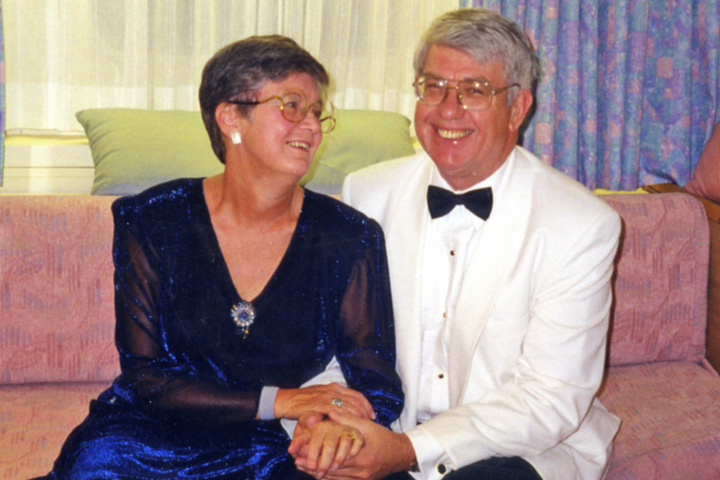For 40 years, Jack Alexander was a professor at WSU’s College of Veterinary Medicine. He is also a father. Occasionally, he has been both at the same time.
“I was planning an important lecture in one of my classes, and a student called who was a new mom,” said Alexander. “She wanted to attend the lecture but couldn’t find a babysitter. I told her she could bring the baby, but she’d have to take him out if he started to cry.
“Well, he started to cry, and I thought, ‘I have four kids. I know how to take care of crying babies.’ So, I took the baby, continued walking up and down the aisles delivering my lecture, and patted him on the back until he fell asleep.”
Childhood Resolve
Alexander was a young child when he decided on his future profession.
“At six years old, I knew I’d be a veterinarian,” he said. “I never questioned it or changed direction. And there was never a day I woke up and had to go to work. I had that kind of a job with veterinary medicine. I loved students and teaching. I loved everything in clinical medicine, radiology, and surgery.”
Born in Ontario in 1934 to Scottish parents, Alexander spent his early years in Scotland and returned with his family to Canada in 1947. In 1960, he graduated from the Ontario Veterinary College (now the University of Guelph) with a DVM, a veterinary surgery degree, and a specialty in radiology. He joined the school’s faculty that year. In 1962, he came to Pullman on a one-year sabbatical to teach surgery. One year became two, and Alexander stayed for 40 years.
As a faculty member and leader, Alexander made innumerable contributions to the College of Veterinary Medicine, the Pullman community, and beyond.
During his tenure, he served as chair of the Department of Veterinary Clinical Medicine and Surgery from 1972 to 1985 (now the Department of Veterinary Clinical Sciences). He was one of the first radiologists certified through the American College of Veterinary Radiology and went on to become the organization’s president. He then established the nationally recognized veterinary radiology program at WSU. He was also president of the Washington State Veterinary Medical Association and selected as a “Veterinarian of the Year” by the group’s Board of Directors.
In one of his pioneering research projects, Alexander developed a left ventricular assist device designed to core and insert the conduit from the left ventricle to the aorta during heart surgeries – a surgical device still used today.
While on sabbatical from WSU in the early ‘70s, he taught at universities in Canada and Taiwan. From 1985-86, he was a researcher and veterinarian with IAMS Pet Food in Ohio. Currently, he is a board member and volunteer for Pullman Child Welfare and the Pullman Food Bank.
Beyond Veterinary Medicine
Though veterinary medicine was his profession, Alexander also pursued a second avocation – building and construction. After high school, he delayed college for three years to work with his father building houses. This experience evolved into an expertise Alexander used to build shelter for others throughout his life.
During his decades-long tenure at WSU, he constructed or remodeled more than 60 houses and buildings, including two homes for his own family. Whether in a classroom or surgery suite, a lab, or on a construction site, a commitment to help others achieve their goals and dreams in a safe space has been the heart of Alexander’s work.
Alexander’s wife, Marilyn, shared his passion for giving. The couple met at a Friday night church dance and, in 2018, celebrated their 60th wedding anniversary. During their time in Pullman, Marilyn ardently supported and cultivated camaraderie across WSU’s veterinary medicine community. All four of the Alexander’s children pursued professions in medicine or education and have made significant contributions in their respective fields.

In 2021, the Alexander Family Resident Award was established to honor the family’s contributions to WSU, the Pullman community, and beyond. The award also recognizes Alexander’s commitment to WSU’s College of Veterinary Medicine and to advancing the field. Though he retired in 2002, his contributions will positively impact the lives of many long into the future. This award was initiated by Dr. Barrie Grant (’67 DVM), Alexander’s former student and colleague. A preference for the award will be given to residents in the three-year radiology program.
“Students leave school with a lot of debt. I worry about them graduating with debt that high and more to worry about,” Alexander said. “This award will help alleviate that, and it’s a way of saying I appreciate what you put into your education.”
“The award is also a good way to remember my wife and honor my family.”
